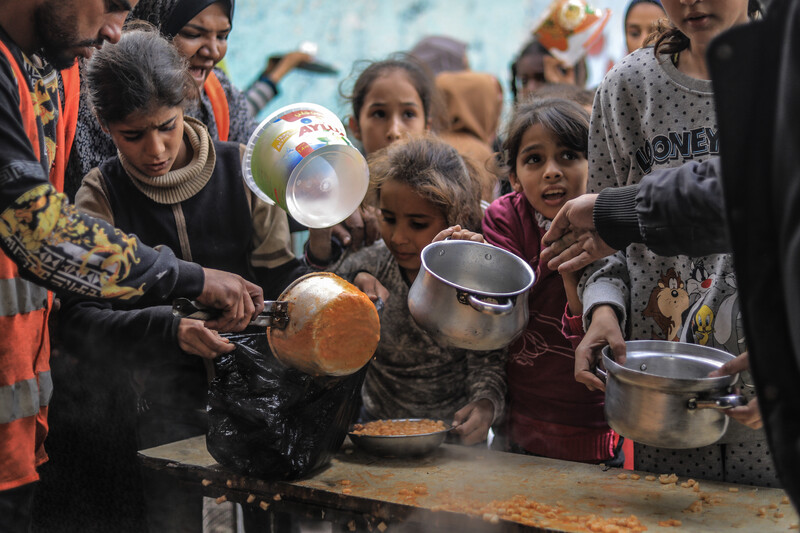The Electronic Intifada 11 December 2023

Food is in short supply for people who have moved – under Israeli orders – to the southern Gaza city of Rafah.
DPA via ZUMA PressRanda and her son Aziz used to live in the Tel al-Hawa neighborhood of Gaza City.
As soon as Israel declared its current war on 7 October, the area was bombarded.
“We did not sleep safely for even one night,” Randa said.
On 13 October, Israel ordered people living in the northern part of Gaza to evacuate.
Randa viewed the order as part of a “psychological war and I did not hesitate to decide that we should stay in our home.”
But that evening “the bombing was crazy,” she said.
“Life was very difficult. There was not enough food or water for me and my son. The occupation cut off electricity and fuel, making things even more difficult.”
After Israel began a series of no-warning attacks on residential towers in Tel al-Hawa, Randa and Aziz fled their apartment. They took shelter in Al-Quds Hospital, which is located in the same area.
A neighbor who works for the Palestine Red Crescent Society brought them to the hospital in an ambulance.
“The hospital is not far away from our home,” Randa said. “But the journey was terrifying as the Israeli airstrikes were very violent.”
Randa described the situation in Al-Quds Hospital as “catastrophic.”
“There were large numbers of displaced people everywhere,” she said. “There were so many that it was not easy for doctors to walk through the hospital’s corridors.”
Randa, 45, has health problems, including diabetes and high blood pressure. She and her son Aziz, 18, had to sleep on the hospital’s floor.
The bombardment in the surrounding area was constant. Windows and doors in the hospital were broken as a result.
“Screaming in terror”
In November, Israel forced people to leave hospitals in Gaza City.
Like so many others, Randa and Aziz set out through a “safe corridor” that was the very opposite of safe. They planned to reach relatives in Khan Younis, southern Gaza.
According to Randa, the journey was “like a horror movie.”
“My son and I walked on foot for about six hours, alongside large groups of people. The children were screaming in terror.”
“We saw corpses of people and animals on the ground, and some of the bodies were being mauled by dogs,” she added. “The smell was unbearable.”
Along the “safe corridor,” people who had been uprooted found themselves “surrounded by the occupation forces, on all sides,” Randa said. “The tanks were pointing at us and Israeli soldiers were shooting at us. We held our IDs in our hands, raising them high.”
Randa said that “what terrified me most” was how Israel was arresting many youths.
“I was afraid that they would arrest Aziz. He is my only son and I have no one in the world but him.”
Eventually, Randa and Aziz made it through a military checkpoint. They were able to take a donkey-drawn cart on the final stage of their journey toward Khan Younis.
The small house where they took shelter in that city was already hosting more than 55 displaced people.
“There was no gas for cooking,” said Randa. “We had to use firewood. We had very little to eat, often just canned food.”
Randa and Aziz had not been in Khan Younis long when Israel began ordering evacuations from some of the surrounding areas, including the area where they had taken shelter.
When Israel destroyed the nearby Hamad City – one of Gaza’s newest residential developments – the explosions were so powerful that they caused damage to the house where Randa and Aziz were staying.
Once again, they had to move.
Randa tried to find an apartment to rent in Rafah, Gaza’s southernmost city, but was unsuccessful.
“Even those who found apartments to rent had to pay huge sums of money,” she said. “Unfortunately, I lost my bank card during my first displacement, and now I have very little cash.”
With the help of relatives, Randa and Aziz found a shipping container in Rafah that provides them the most basic of shelter. They do not have proper blankets now that temperatures have decreased.
Feeding themselves is a major ordeal.
“I feel like I am in a nightmare,” Randa said. “I hope it will end soon.”
Aseel Mousa is a journalist based in Gaza.





